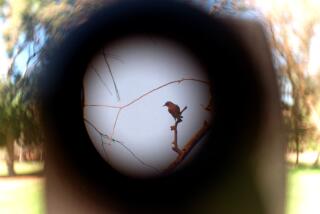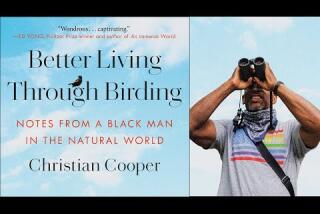Peter Marler dies at 86; bird scientist, birdsong, animal behaviorist
- Share via
When bird scientist Peter Marler and his future wife went to London’s Kew Gardens for their first date, it wasn’t quite a walk in the park.
“We didn’t get 50 yards from the gate before we sat on a bench and watched the pigeons,” Judith Marler recalled. “We didn’t move all afternoon.”
Marler had always been intrigued by birds. As a boy, he raised birds in his family’s working-class home outside of London and more than once had to return items filched from neighbors by his felonious rook. Decades later, he was renowned for bird research that cast a new light on age-old scientific questions but he never lost his admittedly unscientific sense of wonder over “these beautiful, aesthetic, jewel-like creatures.”
Marler, an animal behaviorist who was one of the world’s foremost experts on birdsong, died July 5 at a nursing home in Davis following a long illness. He was 86.
His death came hours a wildfire forced Marler, who had been under hospice care, and his family to flee their house near Winters, about 30 miles west of Sacramento. His family returned safely to the home after his death.
Marler was a professor emeritus in the department of neurobiology, physiology and behavior at UC Davis, where he taught from 1989 to 1994. He previously taught and did research at UC Berkeley and at Rockefeller University in New York.
“He was a foundational force,” said Arthur P. Arnold, a UCLA scientist who researched birdsong under Marler at Rockefeller University. “He was an intellectual giant and he was a mensch.”
Marler is “widely considered to be the father of North American avian bioacoustics,” said author Don Stap in his 2005 book “Birdsong “His early work at Berkeley on the white-crowned sparrow is probably the most cited paper in the literature, and it led to so much subsequent research that the bird has been studied more than any other songbird on the continent.”
Known for the breadth of his intellectual pursuits, Marler also delved into primate communications, investigating monkeys and chimpanzees in Uganda, Kenya and Tanzania. His team found that vervet monkeys issued alarm calls indicating just what kind of predator might be coming along. If there was word of a leopard nearby, monkeys would skitter up the treetops; with warnings of an eagle, they would plunge deep into the bush.
“We had lots of experiences with animals in nature that didn’t gibe with the traditional view,” Marler told a meeting of the American Society of Primatologists in 1983. “It seems they were using the alarm calls as if they were the names of animals.”
But Marler is better known for his rigorous exploration of a deceptively simple question about birds: How do they learn to sing?
For years, scientists thought it was simply a matter of instinct. With a hunch that the answer was far more complex, Marler did decades of rigorous experiments, raising some birds in silence, exposing others only to the songs of alien species, and even deafening birds at particular stages of their development.
His conclusion is an astonishing hybrid of nurture and nature: Most birds must be taught to sing – often by older males – but all have some innate, genetic predisposition for learning the warblings of their own species.
Marler’s findings about birds reverberated with scientists studying babies.
Birds start their learning by “babbling.” They show their greatest ability to learn when they’re very young. They have dialects peculiar to their geographic regions. And they learn much more than what they end up using: “The bird apparently practices what he has heard in infancy and, in the process of rehearsal, so to speak, selects out the final, mature song of its species,” Marler told a Rockefeller University publication in 1980.
Born in London on Feb. 24, 1928, Marler received a bachelor’s degree and a PhD in botany from the University of London. He earned a second doctorate, in zoology, from Cambridge in 1954.
Three years later, he signed on at Berkeley, heading for California on a freighter with a cage full of jackdaws.
The Panama Canal was a birder’s paradise, recalled his wife, who helped Marler raise lab birds throughout his career.
“He just ran from one side of the deck to the other,” she said, “looking at as many birds as he could.”
In addition to Judith, Marler’s survivors include his son Christopher; daughters Catherine and Marianne; two grandchildren; a brother Colin and a sister Pauline.
After nine years at Berkeley, Marler worked at Rockefeller University, staying until 1989, when he helped to establish the Center for Neuroscience at UC Davis.
Working at the university even after his 1994 retirement, he was frequently consulted on animal behavior.
In 2005, he expressed skepticism when asked by a Times reporter about research indicating distinct personalities in desert tortoises.
“Wild blue yonder,” he harrumphed.
On the other hand, he recalled this one particular white-crowned sparrow.
“We had a male who burbled a soft rendition of a particular song while going to sleep,” Marler said. “Of course, you don’t know what was going on inside his head. But it was a song he sang to a specific female he had mated with five years earlier.”
Twitter: @schawkins
More to Read
Start your day right
Sign up for Essential California for the L.A. Times biggest news, features and recommendations in your inbox six days a week.
You may occasionally receive promotional content from the Los Angeles Times.







